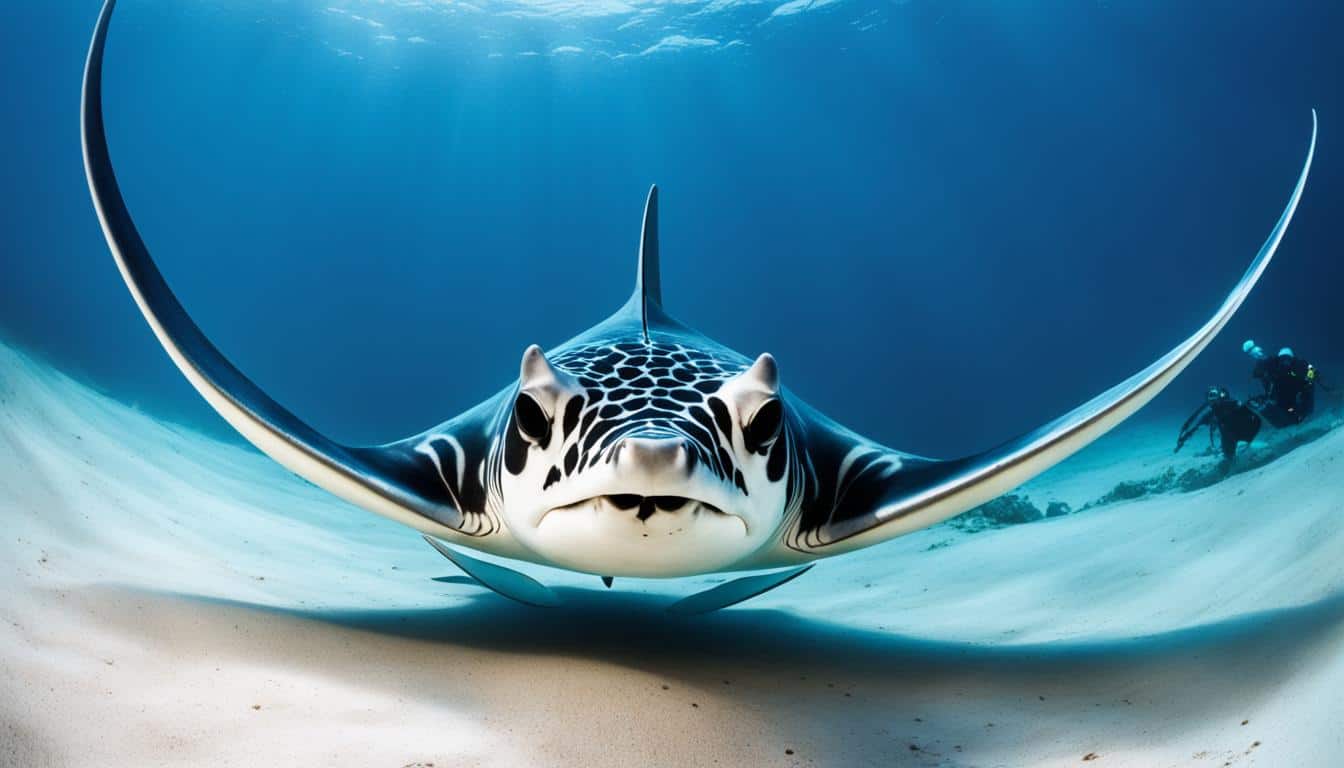The giant manta ray (Mobula birostris) is listed as endangered by the International Union for the Conservation of Nature (IUCN) Red List. You might ask, are manta rays endangered? This shows the big worries about the manta ray population falling due to human actions. Sadly, these beautiful sea creatures are getting fewer, making them one of the 30% of sharks and rays at risk of disappearing. It’s important to understand the need to save these gentle giants.
Understanding Manta Ray Conservation Status
The conservation status of manta rays has become more important in recent years. It shows we need to pay more attention and take action. The current situation is worrying for their future, due to many factors affecting their numbers.
Current Listing on the IUCN Red List
The giant manta ray is now listed as “Endangered” on the IUCN Red List. This change shows the big threats they face, especially the high demand for their gill plates in Asia. This demand is causing a big drop in manta ray numbers, making conservation efforts more urgent. Sadly, less than 30% of manta rays are left due to overfishing and damage to their homes.
Historical Assessment Changes
Older conservation assessments show a worrying trend for manta rays. First listed as “Data Deficient” in 2003, they were later moved to Near Threatened, then Vulnerable, and now Endangered. These changes highlight the dangers of fishing and how slow manta rays reproduce. This makes it hard for them to bounce back.
Threats to Manta Rays
Manta rays are facing big challenges that threaten their survival. It’s important to understand these threats to help protect them. Overfishing and climate change are major concerns that affect manta ray numbers.
Overfishing and Targeted Fisheries
Overfishing is a big risk for manta rays. They are caught mainly for their gill plates, which are seen as a delicacy in some places. This not only harms their numbers but also hurts the health of the ocean.
The demand for manta ray products has led to bad fishing practices. We need rules to stop overfishing and manage manta ray populations sustainably.
Climate Change and Habitat Degradation
Climate change is making things harder for manta rays. It changes their homes and affects their food. Rising sea temperatures and ocean acid make it harder for them to find food.
Severe weather events also damage their habitats. Manta rays face other dangers like getting caught in fishing gear and being hit by boats. We need to spread the word and take action to help them.
Are manta rays endangered?
Many people wonder if manta rays are endangered. These beautiful creatures are facing big challenges. Their numbers are going down fast because of overfishing, targeted fishing, and destroying their homes.

The endangered status of manta rays is very serious. The IUCN says over 30% of sharks and rays are in danger, including many manta rays. We need to understand how our actions affect their survival.
- Overfishing has significantly reduced their numbers.
- Destruction of marine habitats further exacerbates their decline.
- Climate change alters their natural ecosystems, affecting food sources and breeding grounds.
Thinking about the endangered manta ray status makes us realize our role in saving the ocean. By spreading awareness and learning more, we can work together to protect these amazing sea creatures from disappearing.
Manta Ray Conservation Efforts
Exploring manta ray conservation shows us the importance of global agreements. The giant manta ray got protected in 2011 and 2013 through the CMS and CITES. These agreements show a worldwide effort to save manta rays and stop harmful trade.
Global Conservation Treaties
These treaties show how vital manta rays are to our oceans and local communities. Countries work together to protect manta rays and keep them healthy in the sea. This helps spread awareness and encourages sustainable actions worldwide.
Local and International Initiatives
Local and global groups are leading conservation efforts for manta rays. For example, the Marine Megafauna Foundation monitors manta rays and teaches local people about their importance. These efforts tackle threats like overfishing and damage to their homes. By working together, we can help protect manta rays for the future.
FAQ
Are manta rays endangered?
Yes, manta rays are endangered. The International Union for the Conservation of Nature (IUCN) says so. Their numbers have dropped a lot because of human actions.
What is the current conservation status of manta rays?
On December 9, giant manta rays were moved to “Endangered” on the IUCN Red List. This change shows a big drop in their numbers. It’s because of overfishing and damage to their homes.
How have manta rays’ conservation assessments changed over time?
Back in 2003, manta rays were listed as “Data Deficient”. Now, they’re “Endangered”. This change shows the ongoing threats to their survival.
What are the main threats to manta rays?
Overfishing, especially for their gill plates, is a big threat. Climate change, damage to their homes, and getting caught in fishing gear also harm them.
How does climate change affect manta rays?
Climate change makes oceans more acidic and warmer. This hurts manta rays’ homes and reduces their food, zooplankton. This makes it harder for them to survive.
What conservation efforts are being made to protect manta rays?
Many global agreements, like CITES and CMS, help protect manta rays. Local and international groups also work to monitor their numbers and spread the word about their importance.
Why are gill plates significant to manta rays?
People want manta rays’ gill plates for some markets in Asia. This demand is a big reason why their numbers are going down.
What is being done at the local level for manta ray conservation?
Locally, efforts teach communities about manta rays’ value. They also reduce fishing impacts and protect their homes to help them survive.
What organizations are involved in manta ray conservation?
Groups like the Marine Megafauna Foundation and others are working hard. They’re watching over manta rays and protecting them through teamwork and policy changes.







